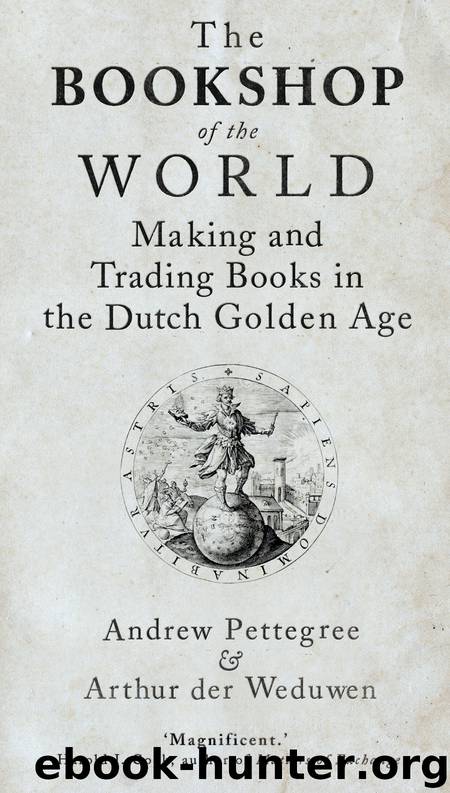The Bookshop of the World by Andrew Pettegree;Arthur der Weduwen;

Author:Andrew Pettegree;Arthur der Weduwen;
Language: eng
Format: epub
ISBN: 9780300245295
Publisher: Yale University Press
CHAPTER ELEVEN
Bookshop of the World
IN THE PREVIOUS CHAPTERS we have had the opportunity to marvel at the sheer number of books emerging from the print shops of the Dutch Republic: books, it seems, for all occasions, and for every pocket; serving every arm of government and every reading citizen. But this active, vibrant domestic market was only one aspect of the role that books would play in building the new state, and by no means the most obvious to those in other parts of Europe struggling to compete with Dutch traders. Indeed, most book industry professionals elsewhere in Europe would have been largely oblivious to the sheer extent of this vastly increased production, the largest proportion of which was wholly directed towards the home market.
This domestic market was only part of the Dutch story. The other essential part was the international trade in books. It was here that the Dutch first served, and then alarmed and angered their neighbours. English collectors had always looked abroad for high-quality books. In the sixteenth century these had come from France and Antwerp; now Amsterdam took over, flooding the London market with English Bibles. Paris had been used to enjoying a commanding presence in the international trade. But in the 1640s customers began to prefer the sleek polished editions of the Elzeviers, and the French book fraternity began to panic.
The English Bibles and French-language Elzeviers were a parable of Dutch success, but made up only a small proportion of the books the Dutch now sold into these markets. Only a very small proportion of the books published in the Netherlands were destined for export, and domestic production was very far from satisfying all the needs of Dutch buyers. Dutch collectors, as we will see, continued to look abroad for most of their requirements in many of the scholarly disciplines: serious works of jurisprudence, science, philosophy and medicine, for instance. The Dutch took such a commanding role in the international trade not through taking over the role of Basel in the production of medical texts, or Lyon’s role in publishing standard works of jurisprudence, but by inventing a re-export trade. Dutch traders would buy quality books in Germany and France, to ship on to England, Scotland and the Baltic, but also to ship German books to France, and French books to Germany. This, perhaps, was their greatest offence to titans of the book world in Paris, Venice and elsewhere. You could not challenge the established order so flagrantly and expect it to go unnoticed. The backlash began in earnest around the middle of the century, and had taken concrete form by the time the Dutch Republic was seriously embroiled in conflict with the emerging powers of the new era of international politics, England and France. But in the meantime Dutch customers had had fifty years during which they could feast upon the products of the European book world, brought to their doorsteps by Dutch booksellers and publishers. Just as Dutch traders in the East shipped
Download
This site does not store any files on its server. We only index and link to content provided by other sites. Please contact the content providers to delete copyright contents if any and email us, we'll remove relevant links or contents immediately.
| Booksellers & Bookselling | General |
| History of Books |
4 3 2 1: A Novel by Paul Auster(11788)
The handmaid's tale by Margaret Atwood(7447)
Giovanni's Room by James Baldwin(6808)
Asking the Right Questions: A Guide to Critical Thinking by M. Neil Browne & Stuart M. Keeley(5355)
Big Magic: Creative Living Beyond Fear by Elizabeth Gilbert(5351)
Ego Is the Enemy by Ryan Holiday(4956)
On Writing A Memoir of the Craft by Stephen King(4662)
The Body: A Guide for Occupants by Bill Bryson(4581)
Ken Follett - World without end by Ken Follett(4443)
Bluets by Maggie Nelson(4261)
Adulting by Kelly Williams Brown(4232)
Eat That Frog! by Brian Tracy(4149)
Guilty Pleasures by Laurell K Hamilton(4116)
White Noise - A Novel by Don DeLillo(3829)
The Poetry of Pablo Neruda by Pablo Neruda(3814)
Fingerprints of the Gods by Graham Hancock(3738)
Alive: The Story of the Andes Survivors by Piers Paul Read(3730)
The Book of Joy by Dalai Lama(3697)
The Bookshop by Penelope Fitzgerald(3619)
